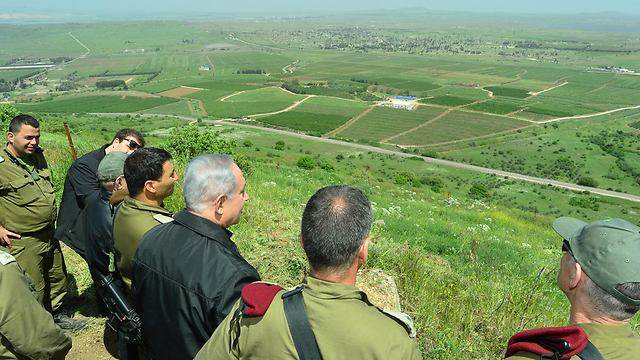
Netanyahu's message to Assad and Putin
Op-ed: While observing a paratrooper drill in the Golan Heights, Prime Minister Benjamin Netanyahu admits to striking Hezbollah weapons shipments in Syria: is this simply a war of words, or the start of something larger?
Netanyahu was quoted during a press conference during the drill saying "We have ISIS on the other side of the fence here, Hezbollah on the other side of the fence, and Hamas and Islamic Jihad in the south."
He continued, saying "we're proud that here, in the stormy Middle East, we managed to preserve our relative peace and quiet here in Israel. We operate when and were we need to operate, including there, over the border, where we have carried out dozens of strikes in order to keep Hezbollah from obtaining weapons which can change the status quo."
These weren't Netanyahu's first statements alluding to alleged Israeli strikes on Hezbollah weapons convoys in Syria. Even Defense Minister Moshe Ya'alon alluded to this several times. But this time, Netanyahu's statement was different, especially in the explicit and almost blunt way he spoke about the issue.
The question is - why did Netanyahu do it, especially as his statements are usually very calculated? And specifically, why did he say it on the Golan Heights and while he was watching a military drill? This makes it seem like more of a threat.

There are three reasons why the Prime Minister could have said these things.
One of the possibilities is that the Prime Minister knows about a concrete threat or possibility that the Iranians or the Syrians are sending advanced weapons to Hezbollah in Lebanon which might endanger the IDF's operational abilities, or which might pose a deadly threat against the Israeli home front, navy, or gas wells.
The Syrians might be trying to deliver shoulder fired or camouflaged surface-to-air missiles which endanger the air force's freedom of operation, Yakhont anti-ship missiles which can hit a naval target 300 kilometers away, or precision Iranian made surface-to-surface missiles. Hezbollah has already tried to bring these weapons into Lebanon, and Israel – according to reports – have largely managed to thwart these transfers.
Assad currently has a dearth of modern, Russian weapons at his disposal, and the risk that these weapons might fall into the hands of Hezbollah is only increasing. Therefore, it can be inferred that the Prime Minister decided that the words of this blunt threat are cheaper than jet fuel or precision missiles, and that he's hoping that his words will reach Hezbollah and its patrons.

While it's true that Israel cooperates with the Russians on a lot of issues, the Russians will not get involved in stopping weapons transfers to Hezbollah. Therefore, it's better to send a direct message as opposed to a strike in Syria or Lebanon which might cause another regional flareup. Israel doesn't want to be involved in a war with Lebanon, and prefers to provide deterrence through messages rather than through weapons.
This is one possibility. Another is that by sending this message from the Golan itself, in the midst of a military drill, the message will be heard not only in Syria, but in Russia as well.
Netanyahu will be meeting with Russian President Vladimir Putin in Russia next week, and he has already warned Putin that Israel has a list of red lines, and that if these red lines are crossed, Israel will not be afraid to react using armed force - even if Russians are present in the area. The Israeli defense minister has also made statements to this regard.
This upcoming meeting between Netanyahu and Putin seems as if it will be about how to mitigate attacking the interests of both parties in Syria. It seems that they will also speak about the Russian transfer of S-300 surface-to-air missile systems to Iran, parts of which have already been delivered.
It's possible to infer that Netanyahu will request the Russians to not deliver the most advanced form of the S-300 to Iran, which can close down the airspace in a 100 kilometer circumference, and can shoot missiles which can reach different altitudes. Netanyahu will also most likely request from the Russians not to provide the Syrian military with SA-22 and SA-17 SAM missiles, which the Syrian regime already attempted to send to Hezbollah in the past.
The third possibility is that Netanyahu didn't intend to send an "operational" message to Hezbollah, but did it to enhance his image as "Mr. Security." This image has been eroded somewhat in the past several months in light of the "knife intifada" and after his failure to block the Iranian nuclear deal. However, Netanyahu already took credit for the decline in the stabbings during a government meeting this week.
It seems that Netanyahu, who loves visiting infantry units and who feels at home amongst the soldiers, has come to the conclusion that Hezbollah, Syria, and the Russians have gotten used to the fact that Israel strikes at shipments of advanced game changing weapons to Lebanon, and therefore allowed himself to brag about it based on the assumption that the other side won't make a fuss.
Or, perhaps all of the above possibilities are correct.











